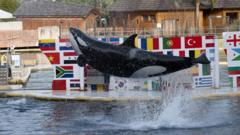Marineland Antibes, Europe’s largest marine zoo, is shutting down due to new animal welfare laws, leaving two orca whales, Wikie and Keijo, without a clear future. The proposed rehoming options—from sanctuaries to other marine parks—have faced intense scrutiny and disagreement, reflecting the complexities surrounding animal captivity and welfare.
Uncertain Future for Captive Orcas as France's Marineland Closes

Uncertain Future for Captive Orcas as France's Marineland Closes
The closure of France's Marineland Antibes raises critical questions about the fate of its two killer whales, sparking debates on animal welfare and the ethics of captivity.
As France's Marineland Antibes prepares to shut its doors, the future of its two captive orcas, Wikie and Keijo, remains highly contentious. The marine zoo, situated on the picturesque French Riviera, announced its closure effective January 5, following the enactment of stricter animal welfare regulations aimed at prohibiting the use of dolphins and whales in entertainment shows. These regulations, which were established in 2021, emphasize humane treatment of marine life, a response to increasing public concern and scrutiny over animal rights.
The decision to close Marineland has ignited a debate among conservationists, animal rights activists, and zoo management regarding the appropriate next steps for Wikie, a 23-year-old orca, and her 11-year-old son, Keijo. The zoo’s management has expressed their belief that transferring the orcas to a marine park in Japan, known for its entertainment shows, would be a suitable option. However, this proposal faced backlash from animal protection advocates who argue that such an arrangement would undermine animal welfare.
Last November, the French government intervened, blocking the transfer due to concerns about Japan’s relaxed animal welfare standards and the long journey of 13,000 kilometers (8,000 miles) that could significantly stress the whales. Currently, another proposed destination is Loro Parque in Tenerife, a Spanish marine park that abides by European welfare laws. However, activists fear that the whales would still be subjected to performances, diminishing their chances for a truly rehabilitative environment.
Experts contend that releasing these orcas into the wild is not a viable option, as both have been born and raised in captivity and lack the necessary survival skills. Hanne Strager, a marine biologist, emphasized throughout her publication, "The Killer Whale Journals," that orcas form deep social bonds with humans, who have provided them care and social interaction throughout their lives. The potential transition to a sanctuary raises questions about the psychological impact it might have on the animals, considering how drastically different their existence would become.
The Whale Sanctuary Project has proposed establishing a semi-natural habitat in Nova Scotia, which would involve containing a significant water area where Wikie and Keijo could reside under human supervision. Proponents of the sanctuary argue that this would allow the orcas to experience an environment more reflective of their natural habitat, albeit without the independence generally associated with wildlife.
Comparisons have been drawn between Wikie and Keijo's plight and that of Keiko, the orca from the 1993 film "Free Willy." Keiko was successfully rehabilitated and led a more natural life following his rescue from captivity; however, the unique circumstances surrounding each whale's captivity raise concerns about the likelihood of such a hopeful outcome for Wikie and Keijo.
In the broader context, the closure of Marineland Antibes epitomizes a growing movement against the captivity of marine mammals, spurred on by documentaries like "Blackfish," which highlighted the adverse effects of captivity on orcas. Prominent advocates, including actress Pamela Anderson, have spearheaded campaigns to close marine parks, increasingly shifting public sentiment against such institutions.
As the final days of Marineland approach, the fate of its resident orcas underscores the ongoing ethical debate surrounding the captivity of intelligent marine animals. The consensus among animal welfare advocates calls for the establishment of humane alternatives that prioritize the orcas' well-being rather than entertainment profit, fueling ongoing conversations about how best to manage these captivating creatures in the future.



















